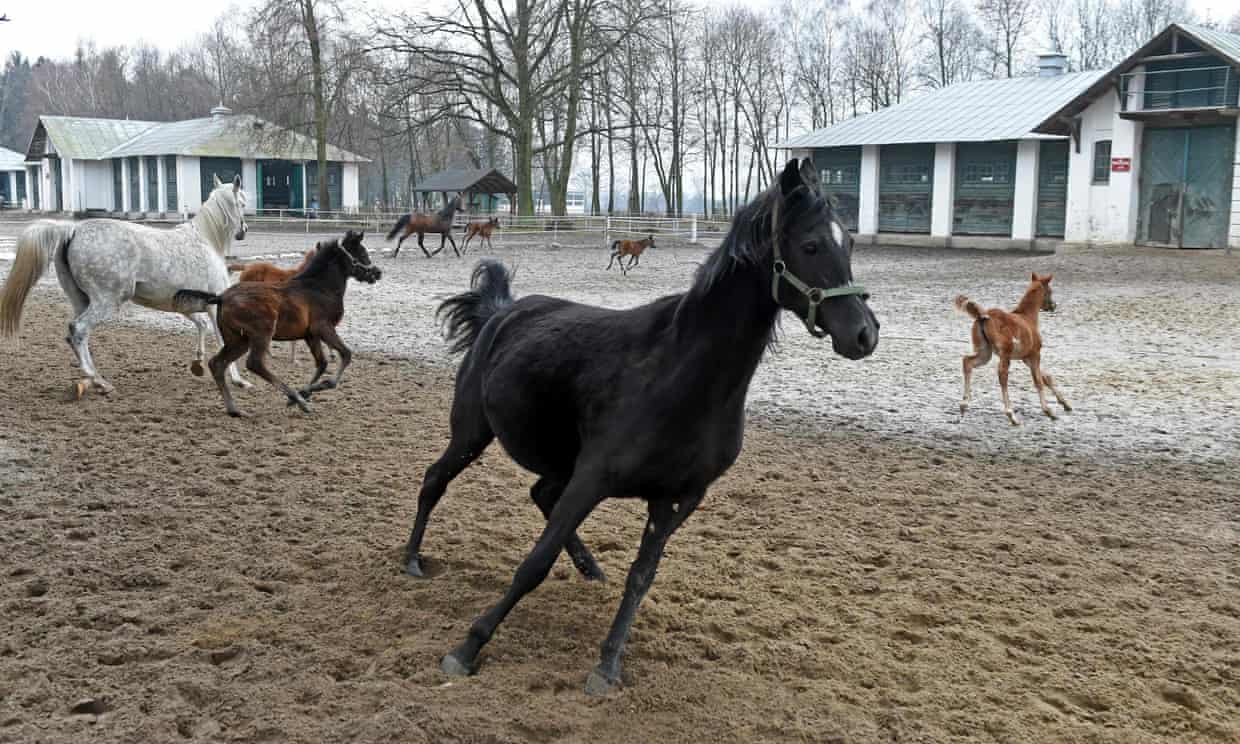Lately Poland's government decided to interfere with the management of these ancient stud farms. Why is this global news? an international scandal? Because the Polish Arab breeding studs have been supplying and augmenting the Arab breed's pedigrees for generations of the international Arab breeding class. And now the breeding stock is imperiled. This particular malfeasance that affects the rich pits the globally rich and famous against Poland's governing class, many of whom are also very wealthy.

Post Card: Janow Podlaski Arabian Stud Horses, Polish Tourism Promotion Poster
During the cold war, the stud discreetly supplied the world’s elite from behind the Iron Curtain, providing a valuable source of hard currency to the communist regime.
The Arabian is considered one of the oldest horse breeds in the world and has been recognised on 4,000-year-old rock paintings. The qualities of Arabian horses – endurance, grace and speed – mean their bloodlines are found in most modern breeds of riding horse. They arrived in Poland in the 16th and 17th centuries as war spoils from battles with the Ottoman empire.

Horses play in Poland’s state-owned Janów Podlaski stud farm. The stud is famous for its world-class Arabian horses but its director was recently sacked. Photograph: Janek Skarżyński/AFP/Getty Images
Among those profoundly affected by the mismanagement instituted by the Polish government's changes to to the personnel running the stud farms is the wife of Rolling Stones' Charlie Watts, Shirley Watts:
The British horse breeder Shirley Watts, who runs a stud in Devon with her husband, Charlie, the Rolling Stones drummer, is threatening to sue Polish government officials after the death of two valuable Arabian mares she owned at a state-run stud in eastern Poland.
Poland’s agriculture minister, Krzysztof Jurgiel, is already facing the ire of the tiny but highly influential Arabian horse breeding world after he sacked three respected state-employed breeding specialists.
The two 16-year-old horses, Amra and Preria, died while in the care of Poland’s prestigious Janów Podlaski stud, to which Watts had loaned four mares in a cashless arrangement to help expand a valuable Arabian bloodline. Her two surviving mares, which are pregnant, were being transported home from eastern Poland to Halsdon stud with urgency.
Poland's government seriously effed-up. Keep politicians -- particularly male politicians -- out of reproductive processes!
She [Anna Stojanowska, Poland's national horse breeding inspector] said: “Poland’s reputation for breeding was hard built, by people with passion who never watched the clock. Trela has been replaced by an economist, Marek Skomorowski, who says horses are his hobby. Once we lose our reputation, that’s it, forever. It happened to Russia’s studs and it may now happen to ours.”
Warsaw-based Stojanowska said the sackings had been “part of political games” by the Law & Justice government, which won the October 2015 parliamentary election pledging to institute “dobra zmiana” – good change – in state enterprises where central government is perceived as having lost control. The policy has already led to dozens of sackings and resignations from state companies including a major regional insurer, PZU, the main electricity and gas utility companies and the mining conglomerate KGHM.

No comments:
Post a Comment